In a reflective essay for the Religion News Service last Wednesday, journalist Kimberly Winston, confessing to being “a little bruised and scared” as a result of the recent presidential election, sought out a church in the city she was visiting so that she might find “some balm for a very banged-up, frightened spirit.”
She picked “a nearby evangelical church.” That the extent of her screening was “nearby” and “evangelical” surprises me a bit. A journalist who, as she said, is not “in search of a story” should know that a bit more research than THAT may be necessary to dodge the charged political environment that too frequently finds its way into public worship.
In February my wife and I, like Ms. Winston, found ourselves in another city over a Sunday. Like her, we were seeking gospel solace and refreshment in a local church. Before we got to the area, I researched churches online, beginning with those bearing the most affinity with my own tradition. We longed for gospel truth absent nods of praise to party, platform, country, or candidate.
We narrowed the search to a few that seemed to offer the greatest promise. Looking more closely, however, we found the profile picture of the pastor of one church showed him standing in front of an American flag. Too much risk there, we decided, and we removed that one from our list. I took a peek at the Twitter feed of the pastor of another candidate church, only to find it full of angry barbs taking aim at one of the major presidential candidates. We removed that one. And so it went. I suppose we, too, might have settled for ‘nearby evangelical,’ but we opted to stay in and forego public worship.
So, I empathize with Ms. Winston’s longing.
And whether she was consciously looking for a story or not, she certainly found it. In the sermon whose title, she found out, was “Make Jesus Great Again,” the preacher, an elderly woman,
…described Donald Trump as a “godly man” who is “God’s instrument” and “a miracle” — proof, she said, that a country can “only wallow in sin so long” before God sends a savior….
After a time Ms. Winston left, “more broken and in need of solace” than when she went in. That is sad.
 But here is the dilemma for preachers and the church. No one should be able to visit our churches without finding the comfort of the gospel. Everything we do should be infused with a message of grace. We should be defined by the gospel we preach, not by the political platform we support.
But here is the dilemma for preachers and the church. No one should be able to visit our churches without finding the comfort of the gospel. Everything we do should be infused with a message of grace. We should be defined by the gospel we preach, not by the political platform we support.
And yet, the message we preach is one that, properly considered, is inherently political. Jesus is king as well savior, and that will have political overtones. In seeking to articulate the kingdom of grace, our message may unavoidably sound political.
If, for example, we want to speak of love, we will drawn to Jesus’s clearest articulation of love for one’s neighbor. There he speaks of a man transcending racial and religious prejudices to sacrificially serve a stranger. If a preacher does not articulate the racial overtones of that story, he will have failed to apply it properly to his congregation and abandons them to be shaped rather by the loudest voices on radio, TV, or internet. If he does articulate the racial aspects, he exposes himself to the criticism that he is too political.
A church should not set out to make political statements, of course. But we do need to seek to shape thinking according to the Scripture. And this we must do with great humility and care. When, as my previous post suggested, the culture is caught up in nationalistic fervor, the church needs to embrace even more passionately its call to serve the kingdom of Christ. And this can be very hard.
I myself should probably not be so sensitive to preachers with flags or a pastor’s personal tweets. I have no intention of giving up on the church. I still believe it is the vehicle through which God intends to bring renewal. Sadly, Ms. Winston is not so sanguine.
“I have no plans to return to a church in anything but a professional role again.”
I hope she is speaking rhetorically. The church needs its best people now to plot a careful path through a difficult time.

Nora B Manwiller
I appreciate your thoughts about how the church needs to consider carefully consider how it relates to a political world. What we have to say indeed does have politically executed application in some cases. But certainly the Gospel message transcends all political parties, countries and cultures while seeking to transform each person who may be a member or citizen of one.
Randy
Agreed on all points. Thanks for your reply.